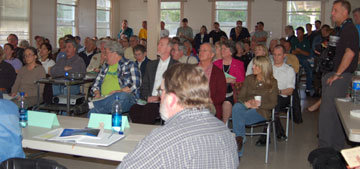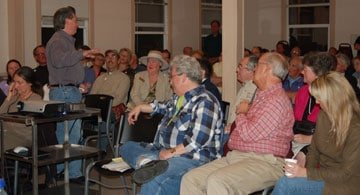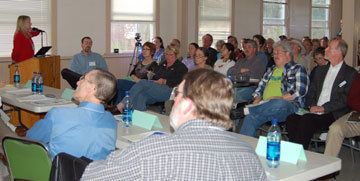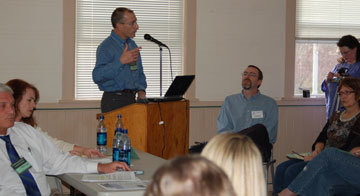On the evening of April 5, the Whitmore Room of the Civic Center was filled to standing room only. The sign-in sheet registered over 100 signatures, which did not include all the presenters and volunteer names.
A five-member panel examined and explained the significant factors of the geoduck dilemma, and after presentations the public asked questions and offered some comments.
 From the state Department of Health, Greg Combs introduced the process used to classify and monitor tidelands for commercial geoduck cultivation.
From the state Department of Health, Greg Combs introduced the process used to classify and monitor tidelands for commercial geoduck cultivation.
“Water quality monitoring is how it all starts,” Combs said and added that the coliform standards from the federal government are stringent and require testing of 10 to 30 samples per station. “There are ongoing water quality tests every day of the workweek,” he said, adding that it is a vigorous process to assure that tests are correct. “One of my jobs is to proof data sheets after approved by the computer. I know every station in the state,” Combs said.
 Sarah Dzinbal from the Department of Natural Resources outlined the studies that determined whether state tidelands should be leased for geoduck aquaculture. The leases will be for 10 years. “We don’t have any leases signed yet,” she said. Currently all the active farms are private.
Sarah Dzinbal from the Department of Natural Resources outlined the studies that determined whether state tidelands should be leased for geoduck aquaculture. The leases will be for 10 years. “We don’t have any leases signed yet,” she said. Currently all the active farms are private.
Taylor Shellfish public affairs manager Bill Dewey introduced some advantages of geoduck farming. It is Dewey’s position that geoduck farming benefits the community because the shellfish life cycle improves water quality. “The geoduck filters about 30 gallons of water per day. Chesapeake Bay is adding back shellfish to improve water quality,” he said. According to Dewey, the farmer benefits financially. It takes six years for the crop to mature and during that time, the farmer may receive $1,000 a year for the lease. After the harvest, the farmer will receive 10 percent of the sale, which may be $60,000 or more.
 Pierce County Councilman Terry Lee outlined the aim of county officials to address property rights’ concerns and conditions that should be required for permits. “Geoduck farming can be a means to offset property tax — a source of revenue. People can stay in their homes,” Lee said.
Pierce County Councilman Terry Lee outlined the aim of county officials to address property rights’ concerns and conditions that should be required for permits. “Geoduck farming can be a means to offset property tax — a source of revenue. People can stay in their homes,” Lee said.
A list of conditions that should be met to protect the property rights of neighbors has been developed. Some examples of those conditions are: securing permits from all agencies involved; no harvesting between 7 p.m. and 7 a.m., on Sundays or state holidays; minimizing noise; marking equipment; maintaining all unnatural debris off beaches; and protecting eel grass beds.
“It is easy to identify these issues,” Lee said. “Science issues are hard to identify.” The job ahead is to develop best science practices for the farms, he said.
 Photos by Rodika Tollefson, KP News
Photos by Rodika Tollefson, KP News
The county will begin hearings on May 7 to determine permit conditions that may eventually become mandatory in the county’s Shoreline Master Plan.
“Come to public hearings — that’s where the conditions for approval come from. Make the people that make the conditions aware,” Lee said. “There are a lot of opportunities for influencing the process.”
Laura Hendricks, co-founder and president of the Henderson Bay Shoreline Association, presented her study of scientific evidence relative to the environmental concerns about geoduck farming. She introduced herself to the audience as the “party crasher.”
“You’ve been hearing all the good things,” she said and began to challenge some of the earlier positions. About property rights she asked, “What rights do we have? What rights, do we take from the next-door neighbor and all of Puget Sound?”
With regard to geoduck farming, Hendricks said, “We are changing our natural habitat,” and listed such concerns as water quality degradation, environmental disturbance caused by pressure-hose harvesting, smelly algae-covered tubes, and shellfish fecal matter.
About the DOH water quality presentation, she said, “You only test for human, not for fecal shellfish waste.” Then she challenged the audience: “The Key Peninsula needs to think about what we want. What are we doing here?”
The forum was sponsored by the Key Peninsula News in collaboration with the Key Peninsula Community Council and Shellfish Partners (comprised of Pierce County Public Works and Utilities Water Programs, Pierce Conservation District and Tacoma-Pierce County Health Department). The intent of the sponsors was to present an unbiased examination of the issue of geoduck farming. Chris Fitzgerald, news editor of the KP News, spearheaded the idea following an eight-month series on the subject. She used the network developed from research for the articles to secure the panelists.
“The reps from the county and industry were people of consequence. They had experiences in their fields. That told me they (those represented) know there is a lot at stake,” she said.
The audience members had the opportunity to ask questions after the presentations as well as make comments.
One of the audience comments came from Susan Mendenhall, who said the lessons from bulkhead experiences took decades to learn. She credited the community for being stewards of the environment but concluded that the forum left her with mixed opinions. “I don’t know where I stand (about geoduck farming). I hope everyone continues to be involved in the process,” she said.
Response received from feedback cards indicated approval of the forum. The survey question “Did you find this forum useful and informative?” only received one single “no” from the 20 percent of the audience who turned them in. The responses also indicated the perplexity of the audience over the question of geoduck farming. When asked their position on the subject, they split evenly “in favor” and “against,” with two undecided. The comments from the audience at the forum showed a similar split, with some of those commenting being geoduck farming supporters and others against it.
More on geoducks
The forum panelists did not get the chance to respond to all audience questions due to limited time. The Key Peninsula News asked them to answer the remaining questions; to see the responses click here.
The Community Development Committee of the Pierce County Council will hold a public hearing on proposed drafted interim regulations for geoduck, docks, floats, and hydraulic lifts on May 7 at 1:30 p.m. in the council chambers in Tacoma.
The Key Peninsula Community Council is gathering information and plans to take a position on geoduck farming in the local community. The council invites community members to attend its June meeting to voice their views, after which time the directors will draft an official position that will be presented to Pierce County Council.
For .pdf files with additional information, see the Department of Health maps below:
West Key Peninsula[/box]
UNDERWRITTEN BY THE FUND FOR NONPROFIT NEWS (NEWSMATCH) AT THE MIAMI FOUNDATION, THE ANGEL GUILD, ADVERTISERS, DONORS AND PEOPLE WHO SUPPORT INDEPENDENT, NONPROFIT LOCAL NEWS